Paruppu payasam recipe with step by step photos. This is a creamy and a delicious payasam made with yellow mung lentils, jaggery and coconut milk. You can even make this payasam as an offering to deities or for your family and friends.
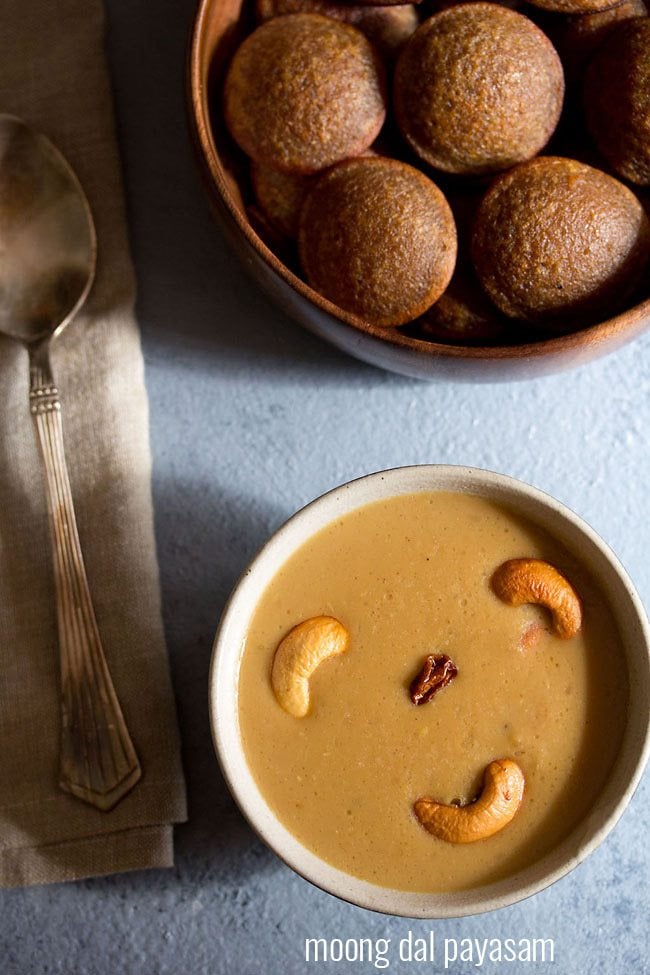
Sharing one more sweet recipe for Ganesh Chaturthi. During festive occasions, payasam is one dish that is made in most households. What is payasam in south India, is called as kheer in North India. There are many recipes of kheer or payasams and this recipe in one such recipe. Payasams are also served in temples as prashad.
Not only I make Kheer, but I also make payasam on occasions. This moong dal payasam is a lovely dessert that can be made not only during festive occasions but also on special occasions or for guests. You can also make moong dal payasam as an offering to the deities or you can make it for your family.
I have kept the paruppu payasam recipe simple and easy for everyone to follow. If preparing for Ganesh Chaturthi or as an offering to Lord Ganesha or any diety, then use homemade coconut milk. You can check this method on How to make coconut milk.
If making for your family or guests, then you can use either homemade coconut milk or store brought coconut milk.
Step-by-Step Guide
How to make Paruppu Payasam
1. Rinse ½ cup moong dal (pasi paruppu) in fresh water a couple of times. Take the moong dal and 1 cup of water in a small pan. Place this pan in a stovetop pressure cooker. Add 1.5 cups water in the pressure cooker.
Pressure cook moong dal for 5 to 6 whistles on medium heat or for 9 to 10 minutes. You can also cook the lentils directly in the cooker. In this case, you can add 1.5 cups water to the lentils and then pressure cook.
The lentils can be cooked in a pan or Instant pot also adding water as needed.
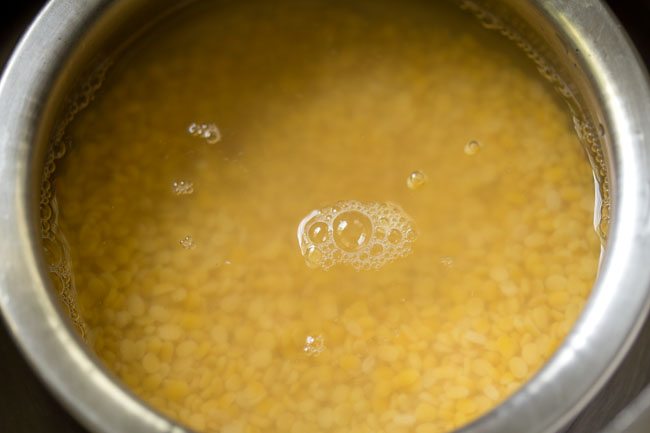
2. When the pressure settles down on its own, then only remove the lid and check the dal. The lentils should be cooked well. They should not be too pasty or lumpy.
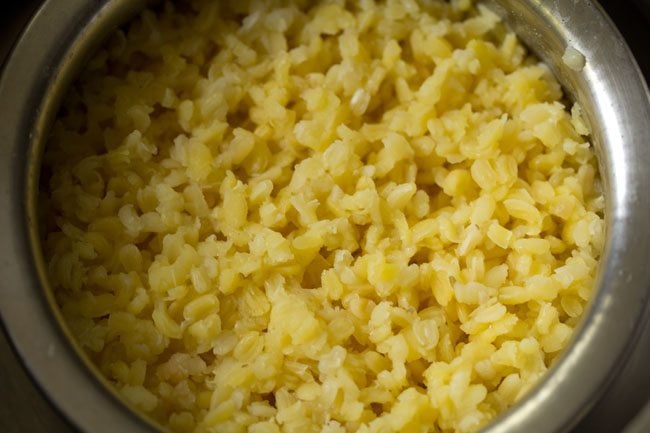
3. Pour the entire contents of the small pan (cooked moong dal + water) in another pan or a kadai.
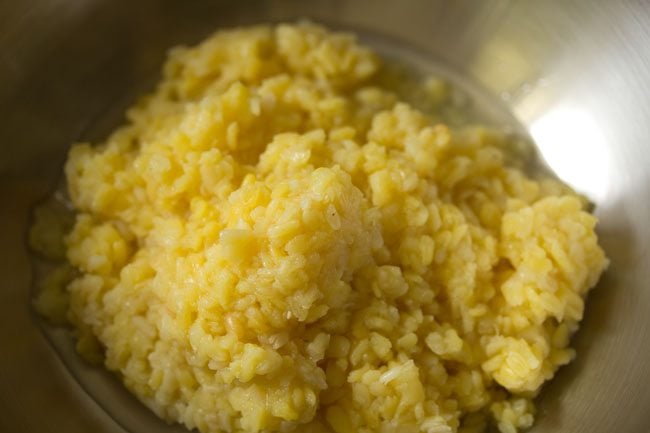
4. Mash the moong dal with a spoon.
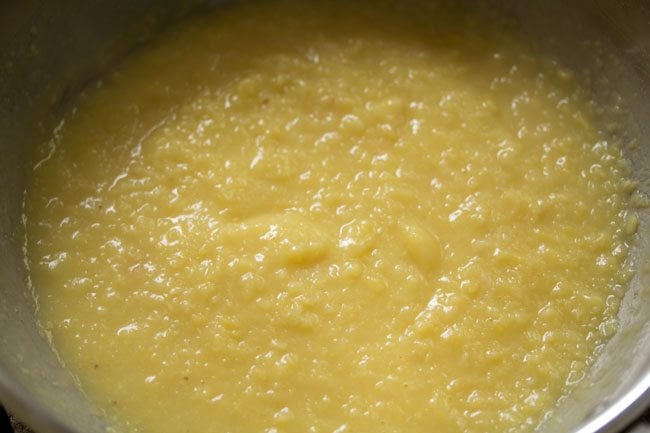
Making pasi paruppu payasam
5. Add ½ cup thin coconut milk or water. Stir and mix well.
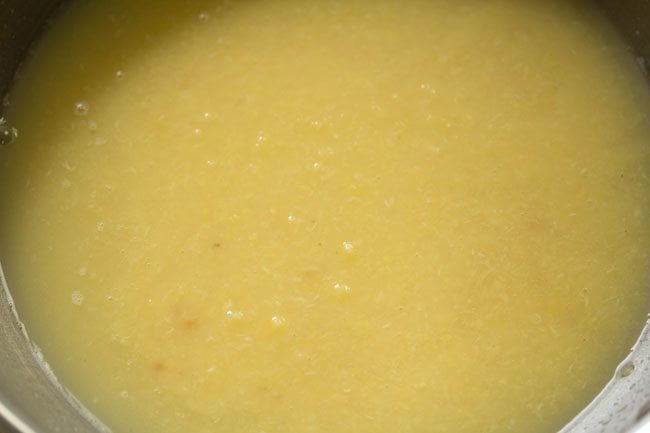
6. Add ¾ cup jaggery powder. For a less sweet taste, you can add ½ cup jaggery powder or grated jaggery.
If the jaggery you use has a lot of impurities, then heat the jaggery in ⅓ cup water on a low heat. Stir till the jaggery melts. Then filter and use this syrup.
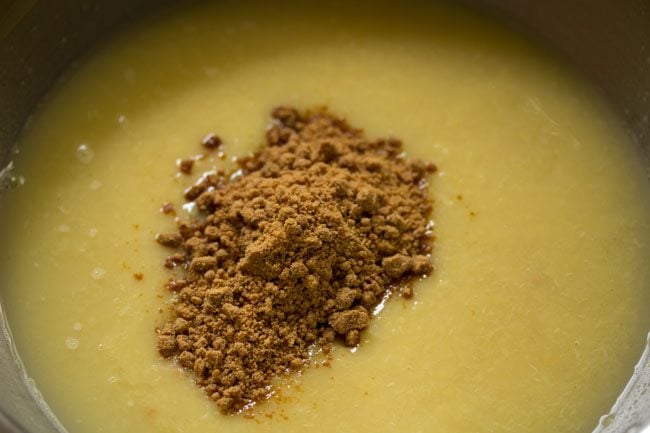
7. Keep the pan or kadai on stove top and on a low flame heat this mixture.
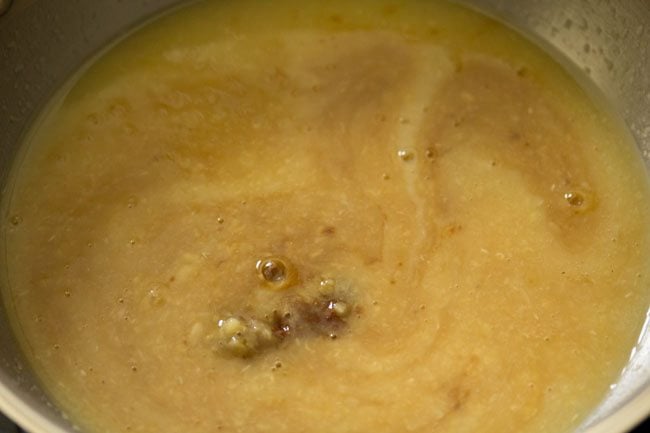
8. Keep on stirring so that the jaggery dissolves.
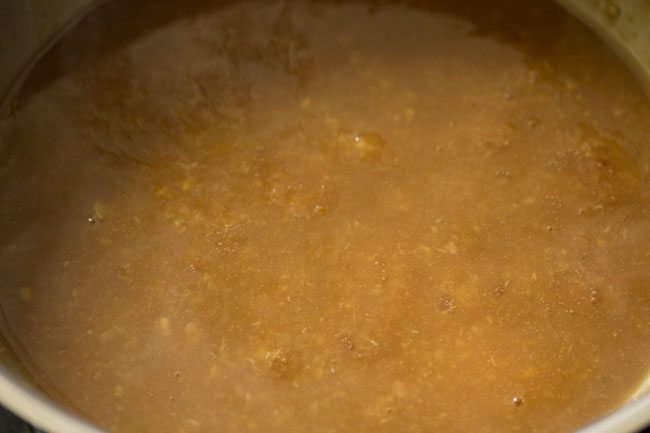
9. Once all the jaggery dissolves, then add 1 cup of thick coconut milk.
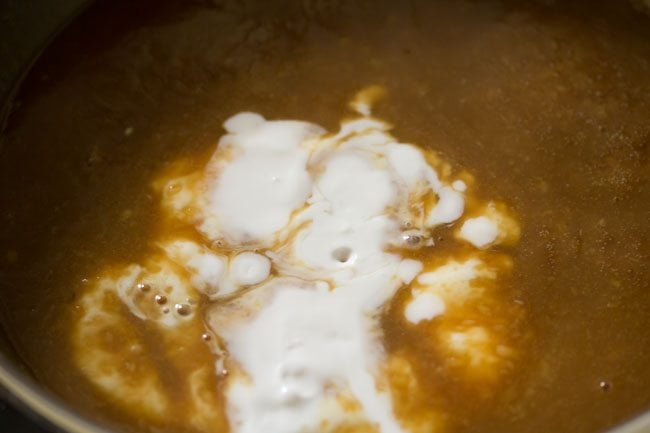
10. Mix very well and just gently heat through for a minute or two. Switch off the heat and keep it aside. Do not over heat or boil as the coconut milk can curdle.
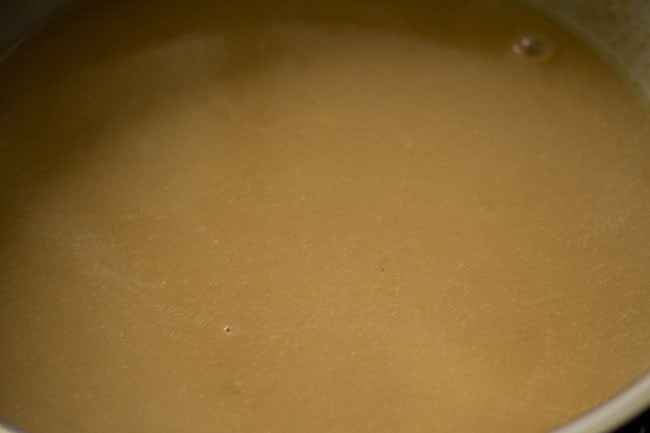
11. In a small pan or tadka pan, heat 2 tablespoons of coconut oil. Add 12 to 15 cashews. Instead of coconut oil, you can also use ghee.
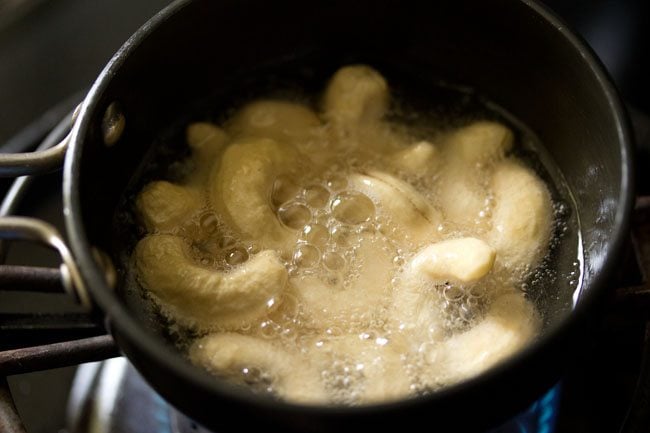
12. Fry till the cashews begin to get golden.
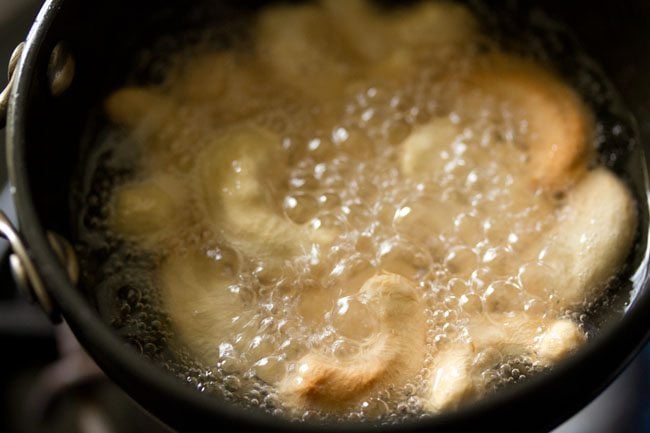
13. Once the cashews start becoming golden, add 1 tablespoon of raisins and ½ teaspoon of cardamom powder.
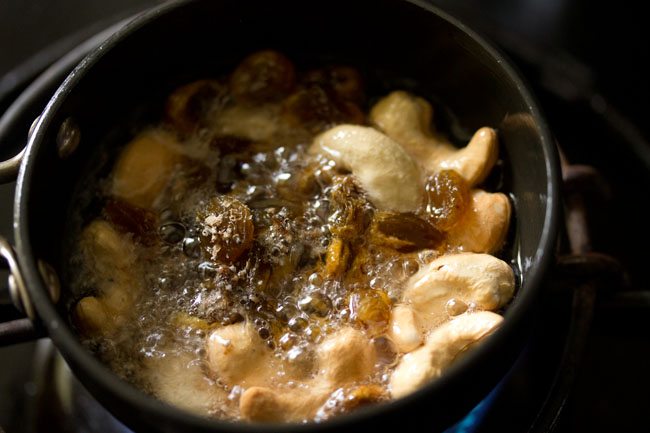
14. Fry the raisins till they become plump and swell.
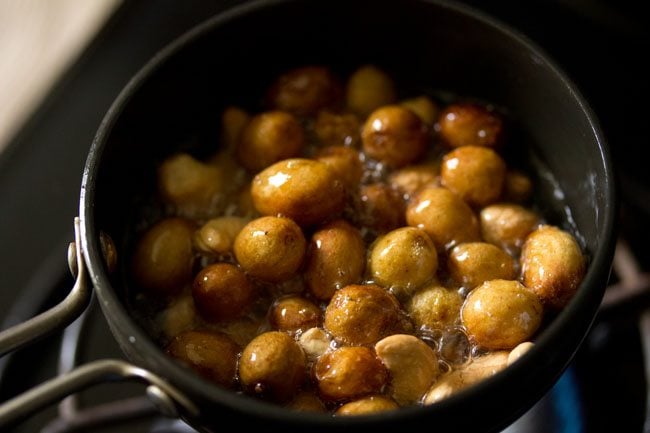
15. Now pour the entire content of the tadka pan (coconut oil + cashews + raisins) in the payasam.
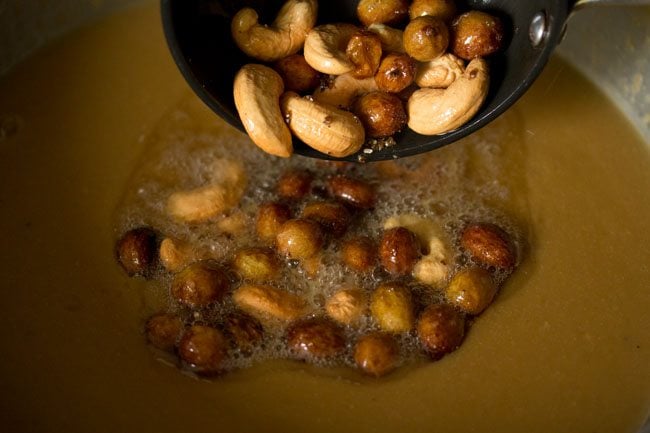
16. Mix very well.
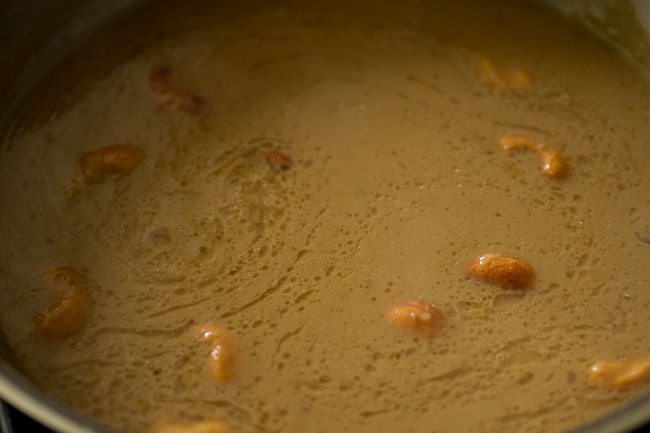
17. Serve pasi paruppu payasam hot or warm. On cooling the paruppu payasam will thicken. Refrigerate the payasam as soon as it comes to room temperature.
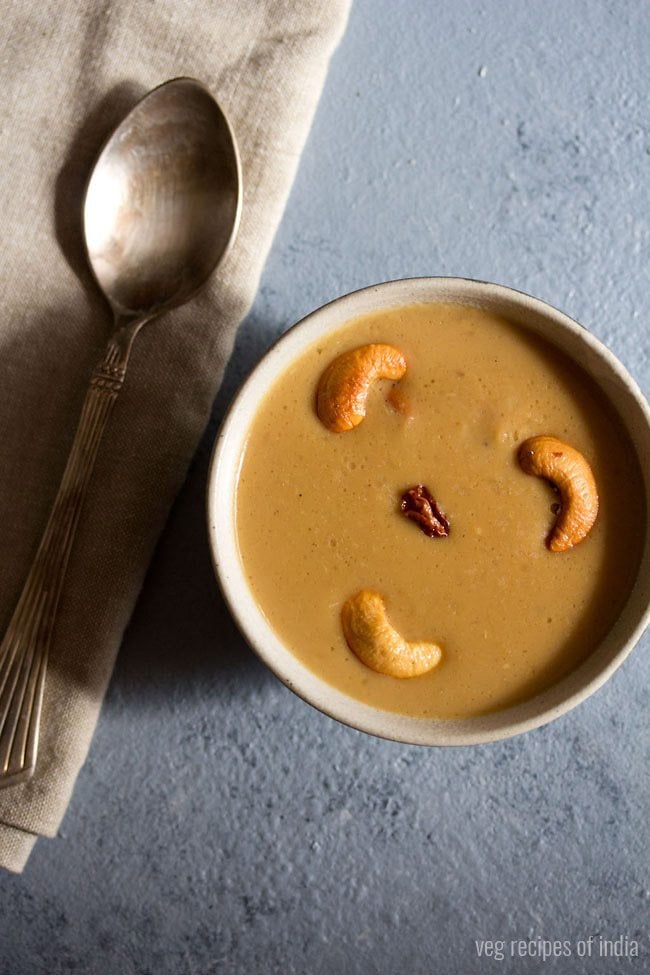
If you are looking for similar recipes then do check:
Please be sure to rate the recipe in the recipe card or leave a comment below if you have made it. For more veetarian inspirations, Sign Up for my emails or follow me on Instagram, Youtube, Facebook, Pinterest or Twitter.
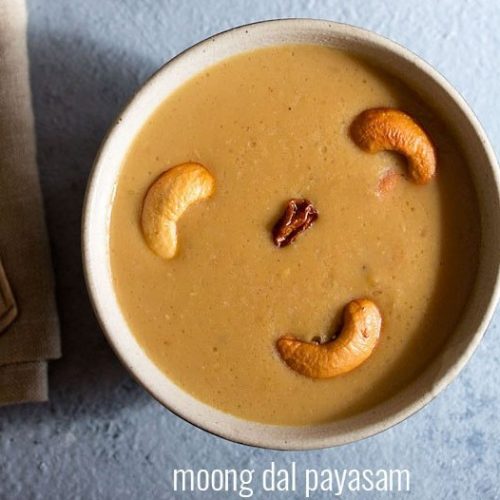
Paruppu Payasam
Delicious creamy moong dal payasam made with yellow moong lentils, jaggery and coconut milk.
Prep Time 15 mins
Cook Time 5 mins
Total Time 20 mins
for cooking moong lentils
other ingredients
cooking moong dal
Rinse 1/2 cup moong dal a couple of times. Take the moong dal and 1 cup water in a small pan.
Place this pan in a pressure cooker. Add 1.5 cups water in the pressure cooker. Pressure cook moong dal for 5 to 6 whistles on medium flame or for 9 to 10 minutes. You can also cook the lentils directly in the cooker. In this case, you can add 1.5 cups water to the lentils and then pressure cook.
When the pressure settles down on its own, remove the lid and check the dal. The lentils should be cooked well.
making paruppu payasam
Pour the entire contents of the small pan (cooked moong dal + water) in another pan or a kadai.
Mash the moong dal with a spoon.
Add 1/2 cup thin coconut milk or water and mix well.
Add 3/4 cup jaggery powder. For a less sweet taste, you can add 1/2 cup jaggery powder or grated jaggery.
Keep the pan or kadai on stove top and on a low flame heat this mixture.
Keep on stirring so that the jaggery dissolves.
Once all the jaggery dissolves, then add 1 cup thick coconut milk.
Mix very well and just gently heat through for a minute or two. Switch off the flame and keep aside. Do not over heat or boil as the coconut milk can curdle.
frying dry fruits
In a small pan or tadka pan, heat 2 tablespoons coconut oil. Add 12 to 15 cashews.
Fry till the cashews begin to get golden.
Once the cashews start becoming golden, add 1 tablespoon raisins and and ½ teaspoon cardamom powder.
Fry the raisins till they become plump and swell.
Now pour the entire content of the tadka pan (coconut oil + cashews + raisins) in the payasam.
Mix very well and serve pasi paruppu payasam hot or warm. Refrigerate the paruppu payasam as soon as it comes to room temperature.
1. Instead of coconut milk you can use milk also. When you add milk then it should be at room temperature and simmer for just 1-2 minutes only. Otherwise it can curdle.
Nutrition Facts
Paruppu Payasam
Amount Per Serving
Calories 646 Calories from Fat 288
% Daily Value*
Fat 32g49%
Saturated Fat 26g163%
Sodium 29mg1%
Potassium 713mg20%
Carbohydrates 80g27%
Fiber 6g25%
Sugar 56g62%
Protein 11g22%
Vitamin A 40IU1%
Vitamin C 2.4mg3%
Calcium 83mg8%
Iron 6.4mg36%
* Percent Daily Values are based on a 2000 calorie diet.
This Paruppu Payasam post from the archives, originally published in August 2016 has been updated and republished on January 2023.
Source: Dassana’s Veg Recipes
